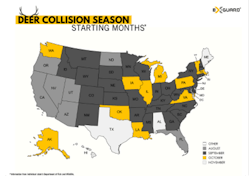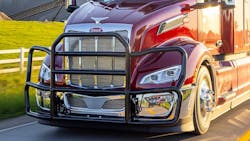It’s rutting season once again the time when deer run across the road with reckless abandon in search of potential mates. Rutting lasts from October to December, starting first in the warmer climates of the South, with Northern deer timing fawns’ birth when spring is in full bloom.
Deer have very little time to get busy, with female deer’s’ estrus (ovulation time) lasting only a few days. The problem for drivers is that the horny males get so frenzied they forget proper safety etiquette. This leads to a higher rate of vehicular accidents during the fall. According to State Farm, there were 1.3 million deer-related auto claims from July 1, 2023 to June 30, 2024, with the most occurring in November.
State Farm also found the top 10 states for risk of animal collisions were:
- West Virginia
- Montana
- Michigan
- Pennsylvania
- Wisconsin
- Mississippi
- Iowa
- South Dakota
- Virginia
- Rhode Island
A 2022 study arguing for daylight savings time to remain permanent found that deer collisions “are 14 times more frequent 2 hours after sunset than before sunset.” By lowering overall traffic when the sun is gone, the U.S. could prevent 33 fatalities and 2,054 injuries, and save $1.19 billion in collision costs annually.
Why this matters to fleets
Deer strikes can total a sedan, and while trucks can outweigh bucks 80,000 lb. to 160 lb., fleets should be aware their assets can suffer serious downtime and costly repairs
“Deer on the move this fall means a higher percentage of deer-vehicle collisions, resulting in more potential damage to your fleet, increasingly expensive repairs and frustrating downtime for your drivers,” stated a new report from Ex-Guard, the maker of popular truck and van grille guards. “Part by part, day by day, the number of this year’s deer versus truck showdowns can quickly rack up and put a serious dent in your company’s bottom line.”
Read more: Deer impact: How much fleets pay in downtime and collision costs
According to a recent white paper from Ex-Guard, the average cost of a day of downtime for fleets is $1,200. This can skyrocket to $50,000 total in extreme cases.
For front-end collisions, the average labor time is about 61 hours, according to an analysis from AdjustRite, an estimating platform owned by PPG.
Another issue is if the vehicle needs to be towed, which get recorded in the CSA database, noted Ex-Guard general manager Ryan Holt. Section 390.5 of the Federal Motor Carrier Safety Regulations defines a DOT-recordable accident as an accident where someone is hurt or killed, and if the “one or more motor vehicles incurring disabling damage as a result of the accident, requiring the motor vehicle(s) to be transported away from the scene by a tow truck or other motor vehicle.”
“These accidents affect fleets’ status with the government, with customers and can even lead to the loss of their ability to operate,” Holt said. “When a truck receives enough damage that it is no longer deemed roadworthy, contracts, licenses and livelihoods are at stake.”
Holt, of course, believes a major preventive measure to avoid deer strikes and other towable accidents is to attach a grille guard to the front of your commercial vehicle.
“We have customers that have seen an 80% decrease in their towable accidents by following a few simple steps, including the installation of Ex-Guard on their fleet,” Holt said.
This year Ex-Guard launched its Generation 3 grille guards, made of high-tensile steel but tdesigned to latch and lift easier. They are also compatible with all current collision mitigation front-end sensors.
Pitt Ohio, which operates around Appalachia and the Midwest, found the ROI for grille guards, which are around $1,200, makes sense compared to risking upwards of $10,000 in collision repairs. The fleet hits more than 100 deer a year.
“We’ve seen strikes where there’s no damage, and we’ve seen strikes with maybe $500 of damage—but it’s a pretty drastic reduction,” explained Taki Darakos, Pitt Ohio VP of maintenance.
About the Author

John Hitch
Editor-in-chief, Fleet Maintenance
John Hitch is the award-winning editor-in-chief of Fleet Maintenance, where his mission is to provide maintenance leaders and technicians with the the latest information on tools, strategies, and best practices to keep their fleets' commercial vehicles moving.
He is based out of Cleveland, Ohio, and has worked in the B2B journalism space for more than a decade. Hitch was previously senior editor for FleetOwner and before that was technology editor for IndustryWeek and and managing editor of New Equipment Digest.
Hitch graduated from Kent State University and was editor of the student magazine The Burr in 2009.
The former sonar technician served honorably aboard the fast-attack submarine USS Oklahoma City (SSN-723), where he participated in counter-drug ops, an under-ice expedition, and other missions he's not allowed to talk about for several more decades.


